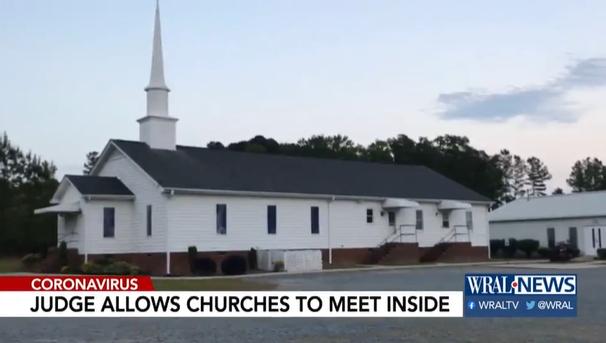NORTH CAROLINA: JUDGE RULES IN FAVOR OF CHURCHES SEEKING TO HOLD INDOOR SERVICES~”THERE IS NO PANDEMIC EXCEPTION TO CONSTITUTION”

NORTH CAROLINA:
JUDGE RULES IN FAVOR OF CHURCHES SEEKING TO HOLD INDOOR SERVICES~
“THERE IS NO PANDEMIC EXCEPTION TO CONSTITUTION”
BY HEATHER CLARK
SEE: https://christiannews.net/2020/05/19/judge-rules-in-favor-of-nc-churches-seeking-to-hold-indoor-meetings-there-is-no-pandemic-exception-to-constitution/; republished below in full unedited for informational, educational and research purposes:
RALEIGH, N.C. — A U.S. district judge in North Carolina has ruled in favor of two churches and a ministry that want to hold indoor services but feel prevented from doing so as executive orders from Gov. Roy Cooper have limited “mass gatherings” to 10 people and a later directive said that larger meetings should “take place outdoors unless impossible.” The judge stated that there is no good reason why churches can’t have indoor services — with social distancing and other protective measures in place — when funeral homes and other locations are allowed to accommodate dozens of people.
“There is no pandemic exception to the Constitution of the United States or the Free Exercise Clause of the First Amendment,” wrote Judge James Dever III, nominated to the bench by then-President George W. Bush.
“Plaintiffs have demonstrated that they are likely to succeed on the merits of their Free Exercise claim concerning the assembly for religious worship provisions in Executive Order 138, that they will suffer irreparable harm absent a temporary restraining order, that the equities tip in their favor, and that a temporary restraining order is in the public interest.”
In March, Gov. Cooper issued Executive Order 116, declaring a state emergency, followed by a series of executive orders, such as order 121, which defined “mass gatherings” as “any event or convening that brings together more than ten (10) persons in a single room or single space at the same time.” Religious services were specifically held to this 10-person limit, while funeral services were limited to 50 people.
Earlier this month, Cooper issued a new order, Executive Order 138, which allowed religious gatherings of more than 10 people, but with the notation that such gatherings should “take place outdoors unless impossible.”
Guidance issued by the director of Legislative Affairs outlined in further detail on the “impossible” factor, “For example, there may be situations in which particular religious beliefs dictate that some or all of a religious service must be held indoors and that more than ten persons must be in attendance.”
Two churches, Berean Baptist Church and People’s Baptist Church, along with the organization Return America, sued Cooper on Thursday, asserting that the “outdoors unless impossible” requirement violates their First Amendment rights under the Free Exercise Clause.
A rally with approximately 500 people was also held next to the state legislative building that same day, according to the Greensboro News & Record.
While Judge Dever noted on Saturday that “[n]o constitutional right — including the right of free exercise of religion — is absolute,” he expressed concern that law enforcement would be the final arbiter of whether it is deemed “impossible” for any particular church to meet outside.
He also pointed out that legal representation for Cooper “could not explain why the governor trusts those who run funerals to have 50 people inside to attend the funeral, but only trusts religious entities and individuals to have 10 people inside to worship.”
“Eleven men and women can stand side by side working indoors Monday through Friday at a hospital, at a plant, or at a package distribution center and be trusted to follow social distancing and hygiene guidance, but those same eleven men and women cannot be trusted to do the same when they worship inside together on Saturday or Sunday. ‘The distinction defies explanation, or at least the governor has not provided one,’” Dever wrote.
He outlined that the churches plan to exercise safety guidelines to protect its members and that those who worship are the same people who go to the stores to shop, and they would not behave any differently based on location.
“[C]ommon sense suggests that religious leaders and worshipers (whether inside or outside North Carolina) have every incentive to behave safely and responsibly whether working indoors, shopping indoors, or worshiping indoors,” Dever said. “The governor cannot treat religious worship as a world apart from non-religious activities with no good, or more importantly, constitutional, explanation.”
“Plaintiffs have pledged to adhere to ‘all recommended COVID-19 social distancing and personal hygiene safety guidelines’ in exercising their free exercise rights,” he noted. “They simply want the governor to afford them the same treatment as they and their fellow non-religious citizens receive when they work at a plant, clean an office, ride a bus, shop at a store, or mourn someone they love at a funeral.”
Ultimately, Dever found that the order does not meet the “narrowly tailored” and “least restrictive means” prongs of the strict scrutiny standard in legal precedent.
“The court trusts worshipers and their leaders to look after one another and society while exercising their free exercise rights just as they and their fellow citizens (whether religious or not) do when engaged in non-religious activities,” he wrote. “Plaintiffs have pledged to practice social distancing and other public health guidelines, just like others under EO 138. Accordingly, the equities tip in favor of granting a temporary restraining order.”
Cooper’s office says it disagrees with the ruling but does not plan to appeal.
“We don’t want indoor meetings to become hotspots for the virus, and our health experts continue to warn that large groups sitting together inside for long periods of time are much more likely to cause the spread of COVID-19,” a statement, as reported by local television station WRAL, reads.
“We urge houses of worship and leaders to voluntarily follow public health guidance to keep their members safe.”
